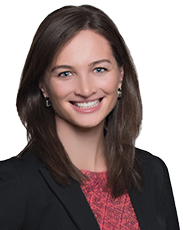The interview below is part of an ongoing effort by McGuireWoods to profile women leaders in private equity (PE). To read previous profiles, click here. To recommend a woman for a future interview, email WPEF@mcguirewoods.com.

Katie-Rose Higgins is a senior associate at Falfurrias Capital, a Charlotte-based PE investment firm that invests in growing, middle-market businesses in sectors where the firm’s operational resources, relationships and sector expertise can be employed to complement portfolio company executive teams. Higgins joined Falfurrias five years ago and is responsible for deal sourcing, deal execution and portfolio company tactical support. She received her master’s degree from Vanderbilt University and B.S. from the University of South Carolina where she studied accounting and finance and played golf collegiately.
Q: Why is it important for more women to pursue careers in PE?
Katie-Rose Higgins: It’s difficult to visualize yourself in a role if you don’t see anyone like you in it. This is one of the reasons why the underrepresentation of females in PE continues. Women often find careers in PE unachievable when they don’t see other women in senior leadership. Gender diversity not only helps PE firms attract more females, but also brings more perspectives and approaches to the table, which stifles groupthink and enhances decision-making.
From an operational standpoint, it’s paramount that PE firms’ portfolio companies trust and connect with the firm and its leadership. How can this be possible when there are a growing number of female executives helming the companies in which we invest?
Q: What is a lesson that you have learned concerning what’s required for success in PE?
KRH: I’ve come to appreciate the value in asking good questions. It’s imperative in all phases of the investment cycle to form thoughtful questions and have the discernment and tact to raise them appropriately.
When developing an investment thesis, it’s important to ask the right forward-looking questions. How will the market landscape change? What business models will be best positioned to succeed? Particularly in a relationship-based industry like middle-market PE, the ability to demonstrate strategic thinking in initial meetings with management teams and founders is key to building trust and offering a window into the potential value add.
The due diligence phase is dominated by lengthy lists of granular questions. As an investor, you have to closely examine every aspect of the business, making it easy to get lost in the weeds. There’s immense value in stepping back to see the whole picture and asking the most basic question: “Is this a business we want to own?”
Q: What actions can firms take to better develop and retain female professionals?
KRH: Working in mergers and acquisitions can be taxing. It’s easy to get burned out by the demands and deadlines on live deals, especially when the work is more tactical than strategic. Unlike men, who may be able to relate to a large peer set doing the same type of work, women have fewer female peers on the same schedule or line of work, which can be isolating. We weigh the trade-off between the personal sacrifices we make with our time, versus the fulfillment at work and opportunity for upward mobility.
It’s precisely for this reason that senior leaders’ investment in an employee’s development can be so impactful. When I started as a first-year analyst at Falfurrias, senior partners often asked my opinions on investment opportunities. This set the tone early that I had the ability to make meaningful contributions to the firm, which made me more engaged in the work I was doing.
I’m fortunate that Falfurrias sponsored my enrollment in a nonprofit board training program that prepared me to serve on a local nonprofit board: The Arts Empowerment Project. Not only did this experience help me develop skills I will need to serve on other boards in the future, but it also showed that the firm was dedicated to me and the causes I am passionate about.
Q: What is a goal that you have set for yourself in the coming year?
KRH: I intend to be more proactive in developing investment theses and sourcing deals. I hope to dedicate more time to connecting with industry experts, operators, market consultants and investment bankers. It’s easy to deprioritize proactive outreach efforts when reacting to more pressing demands that produce immediate, tangible outcomes.
However, there are long-term benefits to persistence and patience in building relationships and industry expertise. I’ve seen this strategy prove itself successful when my colleague, Wilson Sullivan, committed himself to building a relationship with the founder of one of our portfolio companies, Global Plasma Solutions, in 2012, even though there wasn’t an immediate benefit. Over six years later, we transacted and are now partnering together to grow the company in ways it couldn’t have before.
To contact Higgins, email krhiggins@fcp.us.com.